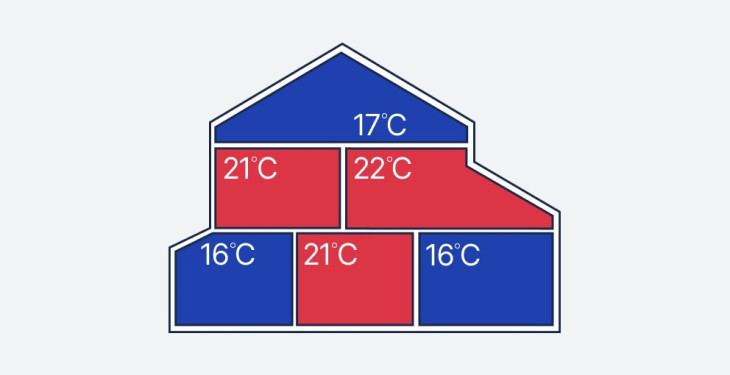

Written by Stephen Day
Gas Safe Engineer
Updated: 16th October, 2025
When it comes to choosing a boiler for your home, understanding the concept of kilowatts (kW) is essential.
Get a new boiler quote, save up to £550 per year (0% APR available).
kW is a measurement of a boiler's heating output, indicating its capacity to generate heat and provide hot water.
In this blog, we will delve into the significance of kW in boilers, highlighting why it's important to consider when selecting a boiler for your heating needs.
We will also explore how modern boilers offer versatility in terms of kW range, and the advantages this brings to homeowners in terms of efficiency and comfort.
Try our free boiler kw calculator tool
Boiler kW, or kilowatt, is a unit of power that denotes the heating output of a boiler. It represents the amount of energy the boiler can generate per unit of time.
The kW rating of a boiler determines its heating capacity and is a crucial factor in ensuring efficient and effective heating in your home.
Choosing the appropriate kW rating for your boiler is essential to meet the specific heating demands of your property and achieve optimal comfort and energy efficiency.
If a boiler's kW is too low for the size of property it’s servicing it may struggle to provide sufficient performance, leading to discomfort or inadequate heating.
If a boiler’s kW is too high then it may result in inefficient performance and avoidable expenses.
Modern boilers are designed with versatility in mind, offering a wide range of kW outputs to cater to various heating requirements:
Today's boilers come in different kW outputs, providing homeowners with options to match their specific heating needs.
From lower kW ratings suitable for smaller properties to higher kW ratings for larger homes, the versatility in kW range ensures that there is a boiler available to suit every household.
The ability of modern boilers to adjust their kW output according to heating demands is a significant advantage.
Advanced modulation technology allows the boiler to modulate the heating output, matching it precisely to the required level.
This adaptability ensures efficient heating operation, as the boiler only uses the necessary amount of energy, minimising wastage and optimising fuel consumption.
Many modern boilers offer zoning capabilities, allowing homeowners to divide their properties into different heating zones.

Each zone can have its own kW requirements, enabling tailored heating control and energy optimisation.
Zoning capabilities ensure that heat is delivered where it's needed, reducing energy waste and enhancing comfort in different areas of the home.
The versatility of modern boilers in terms of kW range brings several advantages for homeowners
By selecting a boiler with an appropriate kW rating for your home, you can achieve optimal energy efficiency. A boiler that matches your heating requirements ensures that it operates at its most efficient level, minimising energy waste and reducing fuel consumption.
This translates to lower energy bills and a reduced environmental impact.
The ability to select the right kW rating for your boiler allows for precise control over the heating system. It ensures that the heat output matches the needs of your home, providing consistent and comfortable temperatures throughout.
Customizable kW outputs enable homeowners to fine-tune their heating settings, adapting to different weather conditions and personal preferences.
Choosing a boiler with an appropriate kW rating helps avoid unnecessary oversizing, which can lead to higher installation costs and inefficient operation.
By right-sizing the boiler, homeowners can optimise their investment, ensuring they only pay for the heating capacity they actually need. This leads to cost savings in terms of upfront expenses and long-term energy usage.

Combis or combination boilers, combine all components and aspects of a heating system (central heating and hot water production) into one succinct and powerful unit.
Their economic size, quick flow rates and dual functionality means combis are extremely efficient and effective when heating a multitude of property sizes, being best suited for small to medium sized homes with 1-2 bathrooms.
System boilers perform best in homes with a high hot water demand, specifically either larger properties with a higher number of residents or properties with two or more bathrooms.
System boilers store hot water in a separate cylinder which provides constant flow access but requires additional (minimal) storage space.
System boilers can service multiple flow outlets at one time, meaning no one in a larger home would be standing around waiting for a shower.
A heat only boiler provides the heat for a home's central heating system and hot water cylinder. A heat only boiler is suited to servicing larger properties with multiple bathrooms/radiators or a business premises with a high water demand.
Heat only boilers do require sufficient installation space within a property, as they use two storage tanks (feed & expansion) as well as the aforementioned hot water cylinder.
Although a combi is generally considered more space saving, a modern heat only boiler is still compact and can supply more bathrooms with hot running water than a combi can.
Here at iHeat we stock a wide range of powerful boilers and you can get a free, fixed price quote in just 60 seconds!
Last updated: 16th October, 2025

Written by Stephen Day
Gas Safe Engineer at iHeat
Stephen Day is a Gas Safe registered and FGAS certified engineer with over 20 years of hands-on experience in the heating, cooling, and renewable energy industry, specialising in boiler installations, air conditioning, and heat pump systems.
LinkedInArticles by Stephen Day are reviewed by iHeat’s technical team to ensure accuracy and reliability.

19th February, 2026
Selecting the appropriate boiler for your London home involves understanding the different...
 Read Article
Read Article

19th February, 2026
A typical Annual Boiler Service includes a visual inspection to identify any obvious fault...
 Read Article
Read Article

19th February, 2026
Boiler servicing comprises a set of inspections and tests conducted by a qualified enginee...
 Read Article
Read Article
No obligation. Takes less than 60 seconds.